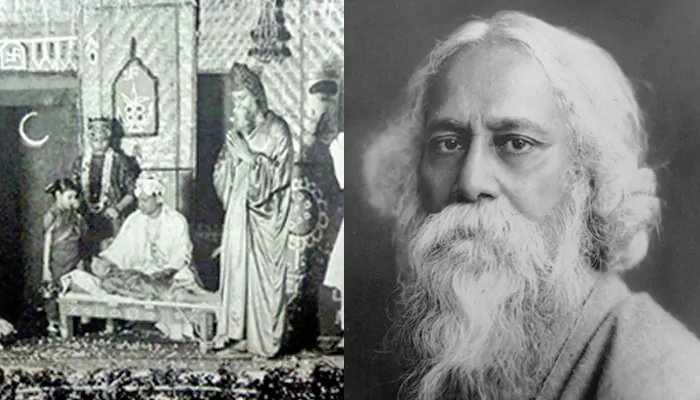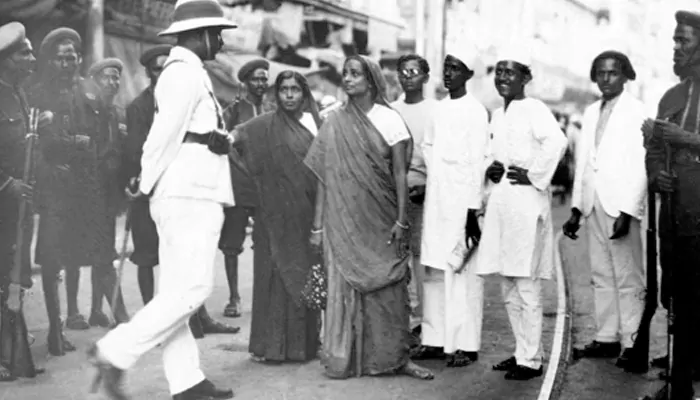Payesh, Pithe & Poetry: Bengal’s Culinary Tributes on Tagore’s Death Anniversary
- Devyani
- 6 months ago
- 5 minutes read

When poetry meets payesh, Bengal stirs up a heartfelt homage to Rabindranath Tagore - dig into the delicious traditions marking his remembrance.
Every year, as the humid monsoon month of Srabon deepens, a unique blend of reverence and sweetness fills Bengali homes and cultural hubs. The reason? We’re remembering Rabindranath Tagore on the anniversary of his passing. Now, you might expect grand speeches or sombre music (and yes, there’s plenty of that!). But here’s the sweet twist: food plays a starring role in this remembrance. Specifically, the comforting embrace of Payesh and the delicate charm of Pithe.
Why Food? Tagore’s Enduring Connection
![]()

(@TajBengal/X)
Gurudev Rabindranath Tagore wasn’t just a poet; he was the very soul of Bengal. His words touched every aspect of life – love, nature, philosophy, you name it. And life, especially in Bengal, is deeply intertwined with food. Tagore himself appreciated the simple joys, the flavours of home. Serving his favourite dishes on 22’se Srabon (which usually falls around August 7th in the Gregorian calendar) isn't just about nostalgia; it's a tangible connection. It’s like saying, "We remember you, we cherish what you loved, and we keep your spirit alive in our everyday rituals." It’s remembrance served warm and sweet.
The Star Attraction: Payesh Takes Center Stage
Nolen Gurer Payesh! pic.twitter.com/jwl6clEl
— Amit Bhowmik (@plantbasedrunnr) April 14, 2012
(@plantbasedrunner/X)
If there’s one dish that truly embodies this day, it’s Payesh. This isn't your ordinary rice pudding. Think fragrant Gobindobhog rice, slow-cooked in milk until it reaches creamy perfection. Then comes the magic touch: rich date palm jaggery (khejur gur), stirred in to lend its deep, caramel-like sweetness and unique aroma. Sometimes, a sprinkle of nuts adds crunch.
Every Bengali household has its own cherished recipe passed down through generations. On Baishe Srabon (the 22nd of Srabon), the scent of Payesh simmering is as much a part of the day as the haunting melodies of Tagore songs (Rabindra Sangeet) drifting in the air. Families gather, cultural societies host programs, and sharing bowls of this warm, comforting Payesh becomes an act of shared love and remembrance. It’s simple, it’s soulful, it’s pure Tagore.
A Winter Delight Makes a Special Appearance: Pithe
You HAVEN’T EATEN THIS BEFORE - I have just eaten Dhudhpuli with Gur flavour … it may just be the most incredible Indian sweet I have ever had … my “quota” was one bite - I ate 3 PIECES… I know you haven’t tried this Bengali sweet, TRY IT NOW pic.twitter.com/I9P2KM54Dh
— Rocky Singh 🇮🇳 (@RockyEatsX) March 25, 2025
(@Gringots_Goblin/X)
Now, here’s an interesting guest star: Pithe. Traditionally, these intricate rice flour dumplings or pancakes, stuffed with sweetened coconut or lentils (kheer), are winter superstars, especially during Poush Parbon. But on Tagore’s death anniversary, you’ll often spot them making a special appearance. Why? It speaks to the depth of the tribute. Preparing Pithe is labour-intensive, requiring skill and patience. Serving it on this day is an extra gesture of devotion, a culinary offering that says, "We’re putting in this effort just for you, Gurudev." While Payesh is the universal comfort food of the day, Pithe signifies that extra layer of care and tradition, a special sweet reserved for the most revered occasions. Finding them, especially outside winter, feels like discovering a precious gift.
![]()

(@TajBengal/X)
Poetry Plates: Where Words and Flavours Meet
The beauty of this commemoration lies in how seamlessly the culinary blends with the culture. Picture this: You walk into a local cultural centre (probasi or sahitya sabha) on Baishe Srabon. The air hums with soulful renditions of Rabindra Sangeet. Someone is reciting a poignant passage from Gitanjali. And then, during a break, volunteers pass around small earthen bowls (shora) filled with warm Payesh, or perhaps delicate Pithe. It’s not a separate feast; it’s part of the experience. The sweetness of the Payesh complements the lingering emotion of the poetry. The act of sharing food becomes part of the shared remembrance, a community bonding over Tagore’s legacy through taste and verse. Homes mirror this too. After listening to the radio broadcast of special Tagore programs, families sit down together to enjoy their Payesh.
![]()

(@TajBengal/X)
So, while the world remembers Rabindranath Tagore as a towering literary figure (rightly so!), Bengal adds its own unique, heartfelt flavour to the homage. Payesh and Pithe aren’t just desserts; they are edible memories, expressions of love, and symbols of cultural continuity. They transform remembrance from a purely intellectual act into something warm, communal, and deeply sensory.
On Srabon 22nd, as the first spoonful of that fragrant Payesh melts in your mouth, you’re not just tasting sweetness; you’re tasting a piece of Bengal’s enduring love for its greatest poet. It’s a tradition that keeps Tagore’s spirit alive, one delicious, heartfelt bite at a time. Truly, a tribute as timeless as his words.












